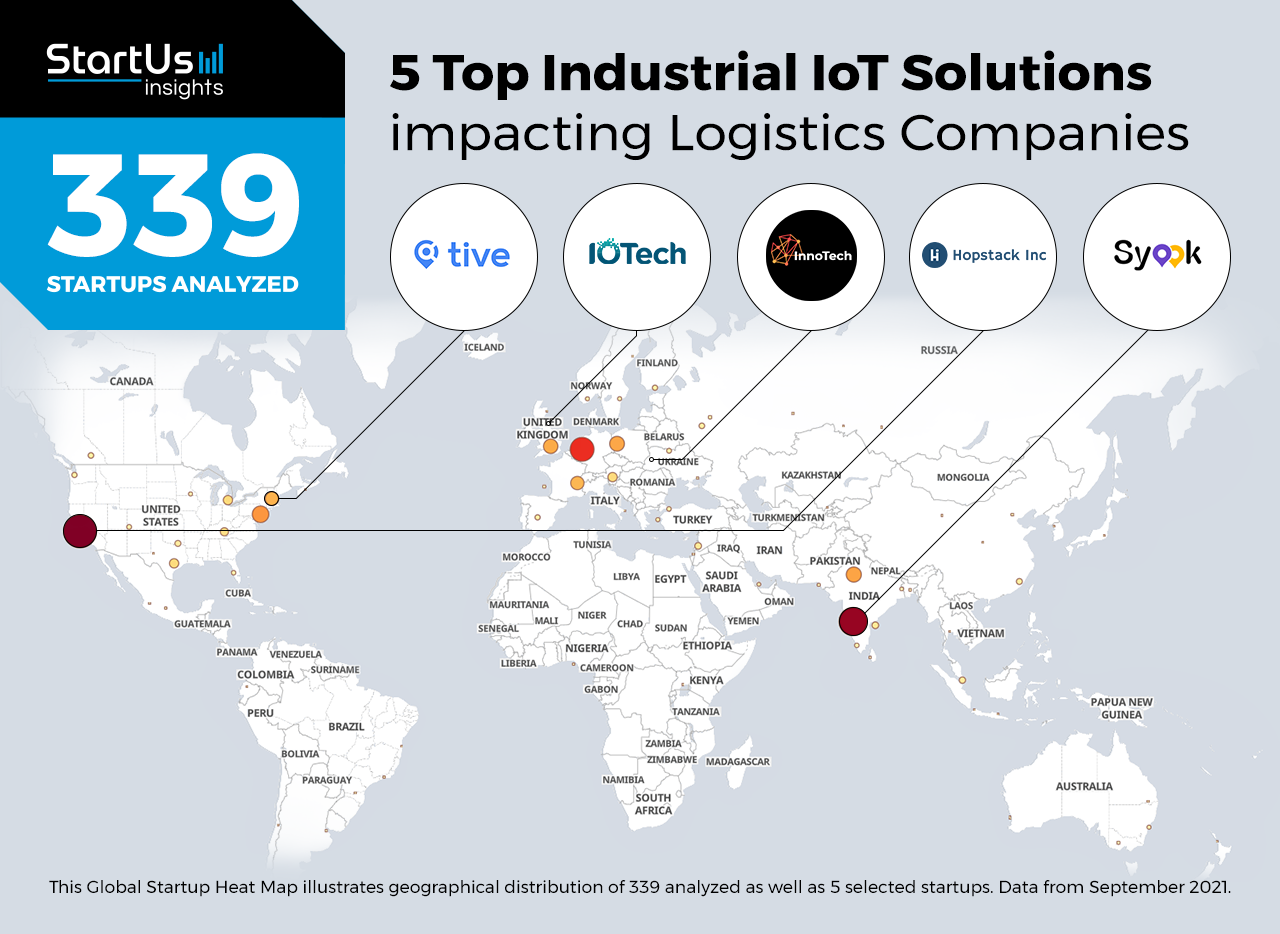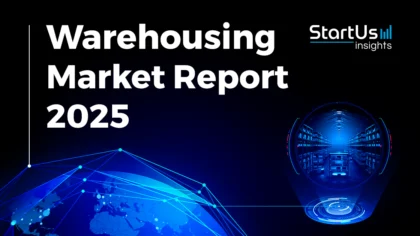Staying ahead of the technology curve means strengthening your competitive advantage. That is why we give you data-driven innovation insights into the logistics industry. This time, you get to discover 5 hand-picked industrial internet of things (IoT) solutions.
Global Startup Heat Map highlights 5 Top Industrial IoT Solutions impacting Logistics out of 339
The insights of this data-driven analysis are derived from the Big Data & Artificial Intelligence-powered StartUs Insights Discovery Platform, covering 2 093 000+ startups & scaleups globally. The platform gives you an exhaustive overview of emerging technologies & relevant startups within a specific field in just a few clicks.
The Global Startup Heat Map below reveals the distribution of the 339 exemplary startups & scaleups we analyzed for this research. Further, it highlights 5 logistics startups that we hand-picked based on criteria such as founding year, location, funding raised, and more. You get to explore the solutions of these 5 startups & scaleups in this report. For insights on the other 334 industrial IoT solutions impacting logistics, get in touch.
Tive enables Location Tracking
Logistics activities depend upon locating, tracking, and delivering goods. This process determines the transparency in operations and bolsters customer trust. However, manual processes do not accurately transmit this information. For example, failure to report a step in the transport of a package makes it difficult to determine the status of a package. Thus, startups develop internet of things (IoT) solutions to log the location of goods across the supply chain.
US-based startup Tive provides location tracking for cargos and fleets. The startup’s proprietary software and sensor solution enable supply chain managers to get real-time insight into shipments. Multi-sensor trackers send location and condition data to the cloud, accessible via the Tive platform. Furthermore, the solution provides notifications when the shipment is not proceeding according to schedule, thereby identifying and assessing bottlenecks.
Hopstack provides Warehouse Automation
Warehouses are the hubs of logistics operations. Many activities happen concurrently, and thus, the transparency of these activities is necessary. Using IoT empowers data-driven decision-making and provides an integrated view of the warehouse. For instance, sensors on forklifts offer insight into the time taken per pallet storage. Thus, startups offer IoT solutions that enable warehouse automation and optimize the processes on the warehouse floor.
US-based startup Hopstack offers warehouse automation through industrial IoT sensors. The solution collects data from robots and IoT sensors on the operating floor and manages all warehouse operations from a single point of control with dynamic resource allocation. Hopstack’s machine learning models also enable self-learning process improvements, such as batching and route optimizations. Thus, the solution identifies chokepoints and improves workflow with plugins and tools.
InnoTech offers Package Condition Management
Parcels spend a lot of time in transit from the source of origin to the last-mile delivery. As a consequence, the responsibility of maintaining the conditions and status of packages falls on logistics companies. Using IoT sensors increases the transparency of package monitoring. For example, live condition tracking of humidity, temperature, and vibration is possible through IoT sensors. This ensures that the end-user receives their package in the best possible condition. Thus, startups design IoT solutions that relay the status of packages while in transit.
Ukrainian startup InnoTech provides package condition management for logistics companies. InnoAI, the startup’s industrial IoT sensor, monitors the geo-location of the cargo and cargo conditions such as temperature, humidity, light, vibration, noise at any point along the supply chain. It also enables the monitoring of geo-location and vehicle diagnostics of trailers and trucks. In addition, the startup provides automated fleet scheduling using AI.
Syook manufactures Fleet Tracking Sensors
Unloading and loading of trucks is a bottleneck in the supply chain. Optimizing the process requires insight into the location of specific vehicles in the fleet. Besides, it is necessary to be aware of the loading order of pallets inside trucks to streamline operations. IoT sensors track and assist in optimizing the loading order of trailers. Because of this, startups develop industrial IoT sensors that assist fleet optimization.
Indian startup Syook integrates sensors into fleets for tracking and monitoring. Truck in Truck out (TiTo) is an industrial IoT solution that monitors the location of trucks for managing the supply chain at warehouses. It also enables paperless gate passes and pre-approved truck information. TiTo provides real-time bottleneck identification and optimal usage of in-facility docks and loading ramps. Further, the startup offers asset and contractor management, among other logistics services.
IOTech designs Integrated Retail Management
Retail solutions require the integration of logistics and supply chain management that includes package tracking, invoicing, and delivery. Contemporary systems separate the two and require different systems for monitoring different issues. However, this provides scope for mistakes and errors along the supply chain. As a result, the optimization of resources and revenue remains absent. Therefore, startups offer IoT solutions that enable the integration of logistics and retail management to increase transparency for users.
British startup IOTech develops sensor solutions to integrate retail and logistics. The startup utilizes a radio-frequency identification (RFID) sensor platform to enable the tracking of packages. The platform also creates new sources of data that help in understanding shopper browsing and buying behavior. Its point-of-sale (PoS) system further enables sales monitoring against inventory to optimize revenue. Thus, IOTech’s solution allows users to visualize and optimize the performance and experience of sales.
Discover more Logistics Startups
Logistics startups such as the examples highlighted in this report focus on retail logistics., lean processes, and picking systems. While all of these technologies play a major role in advancing the logistics industry, they only represent the tip of the iceberg. To explore more logistics technologies, simply get in touch to let us look into your areas of interest. For a more general overview, you can download our free Logistics Innovation Report to save your time and improve strategic decision-making.










